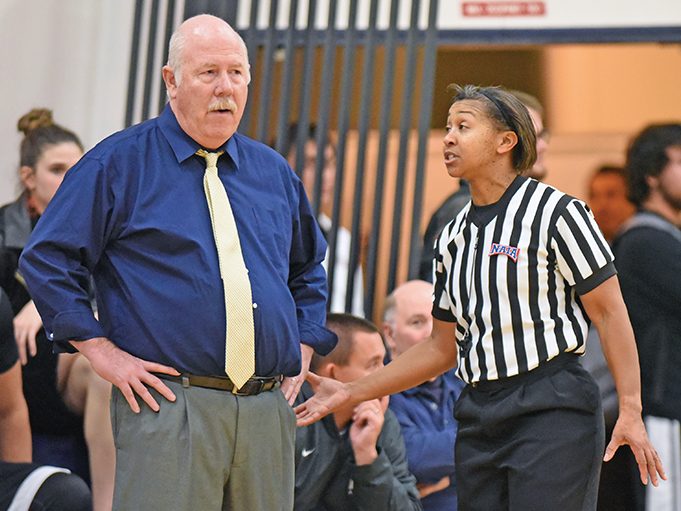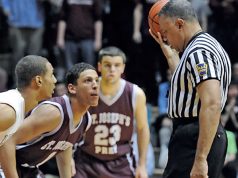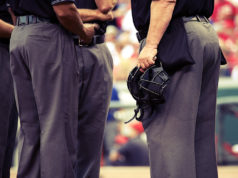As officials, it’s desirable to maintain quality working relationships with the athletic directors of the schools where we work. As in any working relationships presenting and maintaining a professional image, and doing things the right way is important. Few understand this concept better than athletic directors who are also officials.
Referee spoke with four current or former officials who are or have been athletic directors – three from the high school level and one from the college level – to get their insights on things officials do right and the things officials need to do better.

Mike Arndt is the athletic director at St. Catherine’s High School, a private institution in Racine, Wis. He also has busy officiating schedules of his own in wrestling and football while also working an occasional baseball game. He also assigns wrestling officials.
“Communication is the number one thing for me,” Arndt says. “Communication and timeliness of communication.”
Arndt is appreciative when crews coming to work his football and basketball games e-mail him in advance and notify him of their planned arrival time. “We want to know when they’re going to show up,” he says, “so I can meet then and get them where they need to be.
“It provides a sense of relief to know that we don’t have to worry about the officials; they e-mailed and said this is when they’re going to get there.”
In any endeavor, punctuality is a virtue. That axiom is particularly true when it comes to officiating.
“To me, bare minimum (arrival time) is 30-45 minutes (prior to game time),” Arndt says, “depending on the sport, if you’re coming dressed, and where you’re coming from. I don’t want to be waiting 10 minutes before the game and making phone calls to see if this official is going to show up or that official is going to show up. Some sports are more notorious than others and some officials are more notorious than others.
“Some of those officials you know and try to avoid using if you can. It’s a big thing with assignments because you get a bad reputation that way and if you get a bad reputation that way, assignments are going to be harder to come by.”
Arndt says his own background makes him more aware of issues that are of concern to officials that work his school’s games, such as getting paid on game night. “We’re kind of an anomaly that way,” he says. “It’s nice that we’re able to do it, because we’re still a small enough school and our finance department is in our building, so I can get that done most of the time unless there is a last-second change or something like that.”
Arndt says being an active official also helps when inevitable conflicts arise. “It helps me in discussing situations with my coaches,” he says, “and educating them in what’s going on with the officials. For football, wrestling, and baseball, I can discuss rule changes with them. I can go through tests with them. I can take a look at a play and explain ‘This is why this play was called this way,’ or ‘This is how this going to be called.’ Which I think really does help our coaches in their relationships with officials and (teach them) how to better handle situations.”

Chris Curry has been the assistant athletic director at Vernon Hills High School, a public school in Libertyville, Ill outside Chicago, for almost two decades. He also coaches boys’ volleyball in the spring and officiates girls’ volleyball in the ball.
Curry says occasional issues arise when officials have booked multiple games on the same day at different sites.
“We have officials who are trying to get multiple games in in an evening,” he says. “If our schedule changes a little bit, we need to know that we’re still covered, that we still have a solid commitment, even though you may be trying to get to a youth travel league game later in the evening.”
As an administrator, Curry’s chief concerns center on how officials conduct themselves.
“They’re an extension of that educational mission that we have,” he says, “and most of them, I’d say, understand it and the more veteran ones understand it better. (They understand) they’re out there as part of the teaching process.
“And those officials who are out there helping the kids learn and being an extension of that, I think they get a better relationship with the coaches, I think it’s easier for them to have a good relationship with coaches.
“Those who doing the best job, trying to help the kids learn what they just did wrong rather than being sort of ‘Gotcha’ officials, it all goes better for them because of the way they conduct themselves.”
Curry is wary of officials who project what he calls “A confrontational demeanor.
“I get how difficult it is to be the calm center of the storm,” he says, “to rise above, especially of you have young parents and young athletes who don’t have a proper perspective on the athletic contest. If they’re confrontational, it takes a great act of discipline and character to remain non-confrontational.
“But I think some officials for whatever reason, come in a little more confrontational and that usually leads to most of the issues that we have to have a talk about later.
“We all know who’s going to make that final decision, make that ruling. But I think it’s how it’s made, how it’s communicated, and how the official owns it that makes a big difference. We’ve all had to deal with officials who are a bit too showy a bit too much the center of attention made the call and made it in such a way that it was a bigger deal than it needed to be.”
Athletic administrators at schools in rural areas face some unique challenges. The relationship between administrators, coaches, and officials is impacted by the reality that in some areas the pool of available officials is extremely shallow.
It would not be uncommon in some locales for an individual who coaches one or two sport to officiate a third and find themselves working a game for a coach they may compete against regularly in another sport.

Mark Rerick serves as athletic director for the Grand Forks, N.D. school system. He umpires various levels of baseball himself. He currently works high-school games and has worked at the NCAA Division II level. He says it’s important for officials and coaches be able to communicate with each other in a professional manner
“I think there is a pretty good understanding on both sides that officials are human,” he says. “There are going to be mistakes made. When the conflicts come about, most of the time it’s about the way an official communicates with a coaching staff.”
Rerick, who finds it troubling “If we get officials that have that Holier than thou attitude,” he says, “that carry themselves greater than the game and greater than everybody else involved it.
“I think why that bugs me is the message I send to our kids, coaches, and parents. I’m very big on the idea that every game exists with four different groups of people. You have your athletes, you have your coaches, you have your officials, you have your fans. Everybody has a role; in a well-run game, all those people hold tight to their roles.”
Rerick becomes perplexed when he encounters officials who believe their role in the contest is more essential than others.’
“Whether they mistake, or even if it’s a good call, they absolutely refuse to talk to the coaches about it or refuse to talk to the coaches or the captains on the field about it,” he says. “As an umpire if I make a call, I want to believe that I’m able to explain why I made the call I made. Even if it’s a judgment call, I should be able to say ‘From my line of sight, how I saw it, I saw the foot to the bag before the ball hit the glove.’
“But when an official makes a call and is just completely dismisses any question about it, it bugs me. As an official, I think you should be able to explain the call that you made or at least explain why you made that call. And then, if the coach becomes disgruntled with you, now the behavior is on the coach’s shoulders.”
Some Reminders
How officials handle themselves during a contest impacts how they the are perceived, but there are things off the field or court that contribute as well. From our conversations with the ADs who officiate, here are a few reminders:
- Be on time for your assignment. If you’re running late, call. Be sure you have a cell number for the host athletic director or game administrator. The closer it gets to game time, the less likely it is they’ll be in their office.
- Be polite respectful toward the staff at the host school. That means the athletic director, their assistant if they have one, or other faculty members or students.
- Avoid any negative comments about the school or its facilities.
- If you’re dressing on-site, clean up after yourself when leaving.
What's Your Call? Leave a Comment:
Note: This article is archival in nature. Rules, interpretations, mechanics, philosophies and other information may or may not be correct for the current year.
This article is the copyright of ©Referee Enterprises, Inc., and may not be republished in whole or in part online, in print or in any capacity without expressed written permission from Referee. The article is made available for educational use by individuals.

















